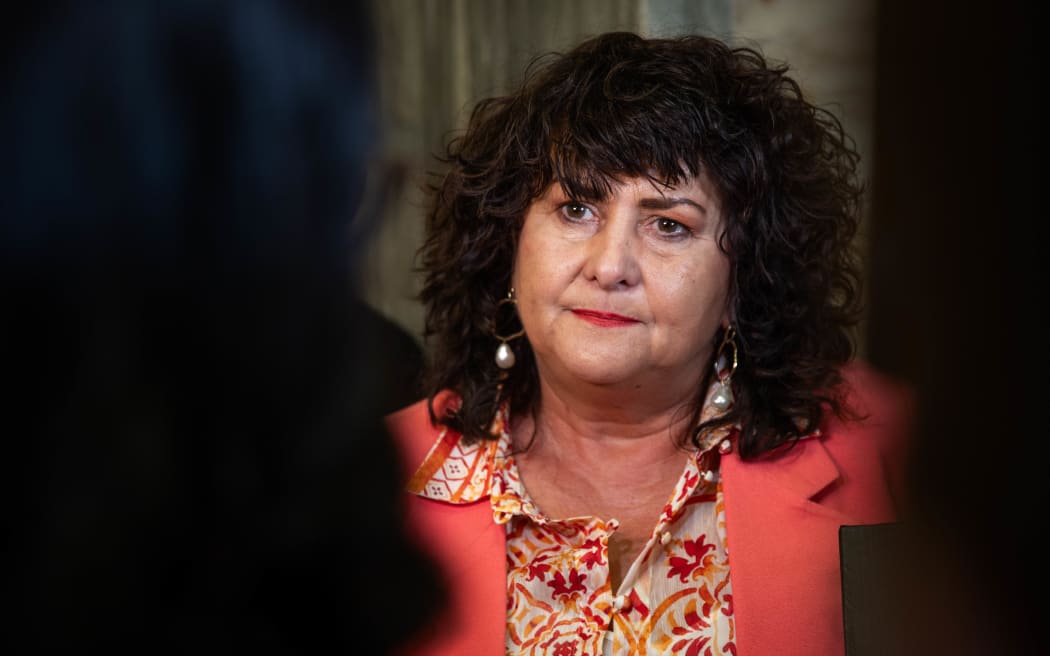
Casey Costello. Photo: RNZ / Angus Dreaver
Campaigners against youth vaping are accusing the government of delaying child-safety measures to give the industry time to sell non-compliant products.
Associate Health Minister Casey Costello denies the tobacco industry influenced her decision to defer a ban on vapes without removable batteries and child proofing mechanisms, which was originally to come into effect on 21 March.
The Ministry of Health said these requirements had been deferred until 1 October to allow for further policy work "to determine a more fulsome picture of current stock and how availability will be affected".
But Vape Free Kids, which met with Costello this week, said the government appeared more interested in ensuring continued availability of vaping products than in protecting young people.
Co-founder Anna Stewart said the minister became "very defensive" when asked who advised her to defer tighter regulations to ensure adequate supply for smoking cessation.
The products in question were supplied by one company, Philip Morris, which only had about a 16 percent share of the country's vape market, Stewart said.
"There are plenty of other products within the 7500 stores in New Zealand that could have met that need if that was what the concern had really been.
"So it does appear unfortunately to us that [Costello] is far more focused on the availability of these products than she is in putting in any caveats or reducing the availability of supply."
RNZ has approached Philip Morris for comment.
Costello told RNZ she had "never met with anyone from the tobacco industry", but had taken advice from smoking cessation groups - including ASH - and health officials on the matter.
She was unable to say which group in particular advised her to defer the child-proofing and battery requirements, except to say she had "received a range of advice on these issues, volumes of it".
"And that's how we came up with the decision that we've made."
The government planned to ban single-use vapes and introduce bigger fines for retailers who sell to under-18s.
Costello said the need to stop youth taking up vaping had to be balanced with ensuring smokers got the help they needed to quit.
"The fact is our addicted smokers are in some of the poorest and lowest socioeconomic groups in New Zealand, and I'm not going to turn my back on them when we've got something that can help them stop smoking."
Vaping Industry Association chairperson Jonathan Devery said its members had prepared for the removable battery and child proofing changes to be implemented from 21 March, which involved "significant investment".
"We were unaware until the minister made her announcement that the date would be pushed out to 1 October."
He said however the timeframes were too short.
"This was a concern to industry, as some companies were looking at having to dump large volumes of product should they be unable to sell noncompliant product through or find alternative markets."
He was unable to comment on the claim the change was to allow "one company in particular" to shift its products, as this did not relate to a VIANZ member.
VIANZ did not accept membership from big tobacco but represented "small, independently- owned Kiwi companies who have no association with the tobacco industry".
Anna Stewart from Vape Free Kids remained sceptical the "dead hand" of the tobacco industry did not play a major role in the decision to defer child-safety features.
"We're really disappointed that we couldn't have had a measure that would have made it more difficult for big tobacco rather than more difficult for families dealing with this on the front-line."
Director of ASH - Action for Smokefree 2025, Ben Youdan, said his organisation did not advise the minister to defer those requirements.
"However we have been very public with our view that removable batteries are not an especially useful requirement for the prevention of youth vaping - and potentially make products more hazardous."
ASH would rather see a ban of disposable vapes, which were mainly used by young people.
"The removable battery regulation was really a waste of time, and a distraction from the wider concerns about disposables. The goal of youth prevention is better served by getting rid of very cheap disposable products."
Child-proofing made sense in order to stop young children accidentally using nicotine, but was highly unlikely to stop older kids and teenagers taking up vaping, he said.
As well as outlawing disposable vapes, ASH supported better enforcement, higher fines and curbing advertising at point of sale.






